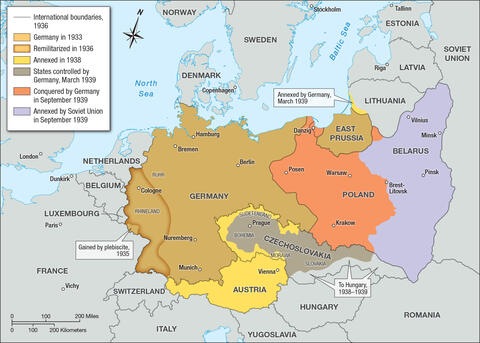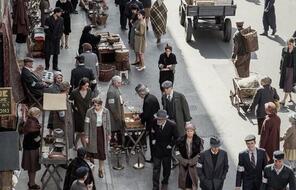Crisis in Czechoslovakia
At a Glance
Language
English — USSubject
- History
- The Holocaust
After taking over Austria, Hitler turned his attention to Czechoslovakia—a country created in 1919 by the Treaty of Versailles that was home to 3 million people of German descent as well as many of other nationalities. Most of the German-speaking Czechs lived in a western part of the country called the Sudetenland, which bordered Germany. (The map below shows the location of the Sudetenland and illustrates Germany's expansion before World War II.) In 1938, with help from the Nazis, many Germans in the Sudetenland agitated for “a return to the Reich.” By summer, Hitler was openly supporting their demands. By September, when the annual Nazi Party rally in Nuremberg was held, Germany was preparing its military for another invasion. Journalist William L. Shirer wrote about the growing crisis in his diary:
Prague, September 11— All quiet here, but you can cut the tension with a knife. Reports that the Germans have massed two hundred thousand troops on the Austro-Czech border. . . . [A]ll awaiting Hitler’s speech tomorrow.
Prague, September 12— The Great Man has spoken. And there’s no war, at least not for the moment. That is Czechoslovakia’s first reaction to Hitler’s speech at Nuremberg tonight. Hitler hurled insults and threats at Prague. But he did not demand that the Sudetens be handed over to him outright. . . . He insisted, however, on “self-determination” for the Sudetens. . . .
Prague, September 13–14 (3 A.M.)— War very near, and since midnight we’ve been waiting for the German bombers, but so far no sign. Much shooting up in the Sudetenland. . . . A few Sudeteners and Czechs killed and the Germans have been plundering Czech and Jewish shops. So the Czechs very rightly proclaimed martial law this morning in five Sudeten districts. About seven this evening we learned that [Konrad] Henlein [the leader of the Sudeten Germans] had sent a six-hour ultimatum to the government. . . . It demanded: repeal of martial law, withdrawal of Czech police from the Sudetenland, “separation” of military barracks from the civilian population. Whether it is backed by Hitler we do not know. . . . Anyway, the Czech government has turned it down. It could not have done otherwise. . . . We wait now for Hitler’s move. . . .
Prague, September 14 (evening)— Drove two hundred miles through Sudetenland. The fighting is all over. The revolt, inspired from Germany with German arms, has been put down. And the Czech police and military, acting with a restraint that is incredible, have suffered more casualties than the Sudeten Germans. Unless Hitler again interferes, the crisis has passed its peak. . . .
Some time after dinner a newsboy rushed into the lobby of the Ambassador [Hotel] with extra editions of a German-language [news]paper. . . . The headlines said: [British Prime Minister Neville] Chamberlain to fly to Berchtesgaden tomorrow to see Hitler! The Czechs are dumbfounded. They suspect a sell-out and I’m afraid they’re right. . . .
Prague, September 16— . . . Berlin reports Hitler has demanded—and Chamberlain more or less accepted—a plebiscite [vote] for the Sudeteners. The government here says it is out of the question. But they are afraid that is what happened at Berchtesgaden.
Prague, September 18— The Czechs are stiffening as it becomes evident that Chamberlain is readying to support Hitler’s demands for taking over Sudetenland and indeed, in effect, Czechoslovakia. . . .
Later.— I must go to Germany. At midnight [journalist Edward R.] Murrow phoned from London with the news. The British and French have decided they will not fight for Czechoslovakia and are asking Prague to surrender unconditionally to Hitler and turn over the Sudetenland to Germany.
Berlin, September 19— The Nazis, and quite rightly too, are jubilant over what they consider Hitler’s greatest triumph up to date. “And without bloodshed, like all the others,” they kept rubbing it in to me today. As for the good people in the street, they’re immensely relieved. They do not want war. The Nazi press full of hysterical headlines. All lies. Some examples: WOMEN AND CHILDREN MOWED DOWN BY CZECH ARMOURED CARS, or BLOODY REGIME—NEW CZECH MURDERS OF GERMANS. . . .
No word from Prague tonight as to whether the Czechs will accept Chamberlain’s ultimatum.
Berlin, September 26— Hitler has finally burned his last bridges. Shouting and shrieking in the worst state of excitement I’ve ever seen him in, he stated in the Sportpalast [arena] tonight that he would have his Sudetenland by October 1—next Saturday, today being Monday. If [President of Czechoslovakia Edvard] Beneš doesn’t hand it over to him he will go to war, this Saturday. . . .
Munich, September 30— It’s all over. At twelve thirty this morning—thirty minutes after midnight—Hitler, Mussolini, Chamberlain, and [French Prime Minister Édouard] Daladier signed a pact turning over Sudetenland to Germany. The German occupation begins tomorrow, Saturday, October 1. . . . [Hitler] gets everything he wanted, except that he has to wait a few days longer for all of it. His waiting ten short days has saved the peace of Europe—a curious commentary on this sick, decadent continent. . . .
Czechoslovakia, which is asked to make all the sacrifices so that Europe may have peace, was not consulted here at any stage of the talks. Their two representatives . . . were told at one thirty a.m. that Czechoslovakia would have to accept, told not by Hitler, but by Chamberlain and Daladier! 1
The Czechs were outraged by the agreement. And it worried at least one of the leaders who had negotiated the deal. When Daladier returned to Paris, he fully expected to be attacked for his failure to stand up to the Germans. Instead he received a hero’s welcome. He shook his head and muttered that those who rejoiced at the pact were fools.
Chamberlain knew that the alternative to the agreement was a European war, for which Britain was simply not ready. In anticipation of the kind of bombing that had already been used in the Spanish Civil War, gas masks were issued to the civilian population in Britain. Chamberlain declared in a radio broadcast to the British people, “How horrible, fantastic, incredible it is that we should be digging trenches and trying on gas-masks here because of a quarrel in a far-away country between people of whom we know nothing.” 2
After he returned to Germany from Czechoslovakia to announce the agreement, Chamberlain was greeted as the leader who had prevented war. Thousands of Germans lined the streets of Munich to cheer the British leader as he traveled to the airport. When he landed in London, a crowd gathered to applaud his promise that the pact would bring “peace for our time.” He added that it would be a “peace with honor.”
In Germany, too, there was widespread relief that war had been avoided. But although he enjoyed strong support for bringing the Sudetenland Germans into the Reich, Hitler was disappointed that war had been avoided. To him, war was an inevitable and welcome part of the struggle between races that drove history forward. For Hitler, war was “a key instrument of policy; not the last resort, but in some instances the preferred approach.”
3
His willingness to go to war meant that Hitler was unlikely ever to compromise. He would demand time and again that his opponents give in completely to his demands.
- 1William L. Shirer, Berlin Diary: The Journal of a Foreign Correspondent, 1934–1941 (New York: Knopf, 1941), 120–47. Reproduced by permission of Don Congdon Associates, Inc.
- 2Quoted in Richard J. Evans, The Third Reich in Power (New York: Penguin, 2005), 672.
- 3Gerhard L. Weinberg, Germany, Hitler, and World War II: Essays in Modern German and World History (Cambridge: Cambridge University Press, 1996), 37.
The Growth of Nazi Germany

The Growth of Nazi Germany
Between 1933 and 1939, Greater Germany expanded significantly as a result of the Third Reich’s annexations and conquests in eastern Europe.
Connection Questions
- What were the underlying reasons for Hitler’s demand that the Sudetenland become part of the German Reich? What turned this demand into an international crisis?
- Evaluate the agreement that was made about the Sudetenland. Which parties had to give something up? Which parties gained something in return?
- Historians often refer to this agreement as “appeasement.” What does it mean to appease? When might one nation try to “appease” another? What could be the benefits of such a policy? What might be the dangers?
How to Cite This Reading
Facing History & Ourselves, "Crisis in Czechoslovakia," last updated August 2, 2016.








